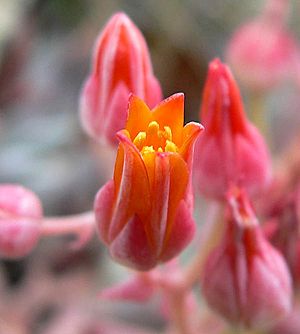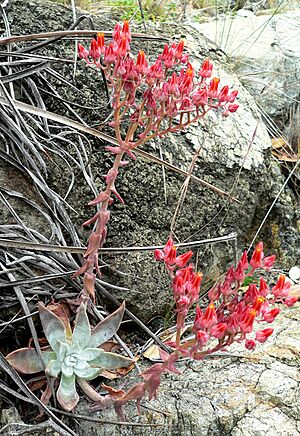Dudleya cymosa facts for kids
Quick facts for kids Dudleya cymosa |
|
|---|---|
 |
|
| Conservation status | |
| Scientific classification |
|
| Kingdom: | Plantae |
| Clade: | Tracheophytes |
| Clade: | Angiosperms |
| Clade: | Eudicots |
| Order: | Saxifragales |
| Family: | Crassulaceae |
| Genus: | Dudleya |
| Species: |
D. cymosa
|
| Binomial name | |
| Dudleya cymosa (Lem.) Britton & Rose
|
|
| Script error: The function "autoWithCaption" does not exist. | |
| Synonyms | |
|
Echeveria cymosa |
|
Script error: No such module "Check for conflicting parameters".
Dudleya cymosa is a cool plant often called the canyon live-forever. It's a type of succulent plant, which means it has thick, fleshy parts that store water. You can find this plant growing in rocky places. It lives in the lower parts of mountains in California and southern Oregon.
What it Looks Like
The canyon live-forever is easy to spot! It has a special base called a basal rosette. This looks like a flat, circular bunch of gray-green leaves. From this base, tall, straight stems grow upwards. These stems are often a bright red-orange color.
At the top of these stems, you'll see small flowers. They are shaped like tiny thimbles and are yellowish-red. These flowers grow in a special cluster called a cyme. Some types of this plant are rare in certain areas.
Different Types of Canyon Live-Forever
There are several different kinds of Dudleya cymosa. These are called subspecies. Think of them as close relatives with slight differences. Here are a few examples:
- Dudleya cymosa subsp. costafolia - also known as the Pierpoint Springs dudleya.
- Dudleya cymosa subsp. crebrifolia - called the San Gabriel River dudleya.
- Dudleya cymosa subsp. marcescens - known as the marcescent dudleya.
- Dudleya cymosa subsp. ovatifolia - the Santa Monica Mountains dudleya.
Two of these subspecies, marcescens and ovatifolia, are very important. The United States government lists them as "threatened species." This means they are rare and need special protection to help them survive.
Home for Butterflies
The Dudleya cymosa plant is very important for a specific butterfly. It is the main "host plant" for the Sonoran blue butterfly. This means the butterfly, named Philotes sonorensis, lays its eggs on this plant. When the eggs hatch, the caterpillars eat the leaves of the Dudleya cymosa. This helps them grow into adult butterflies.
See also
 In Spanish: Dudleya cymosa para niños
In Spanish: Dudleya cymosa para niños
 | Sharif Bey |
 | Hale Woodruff |
 | Richmond Barthé |
 | Purvis Young |



